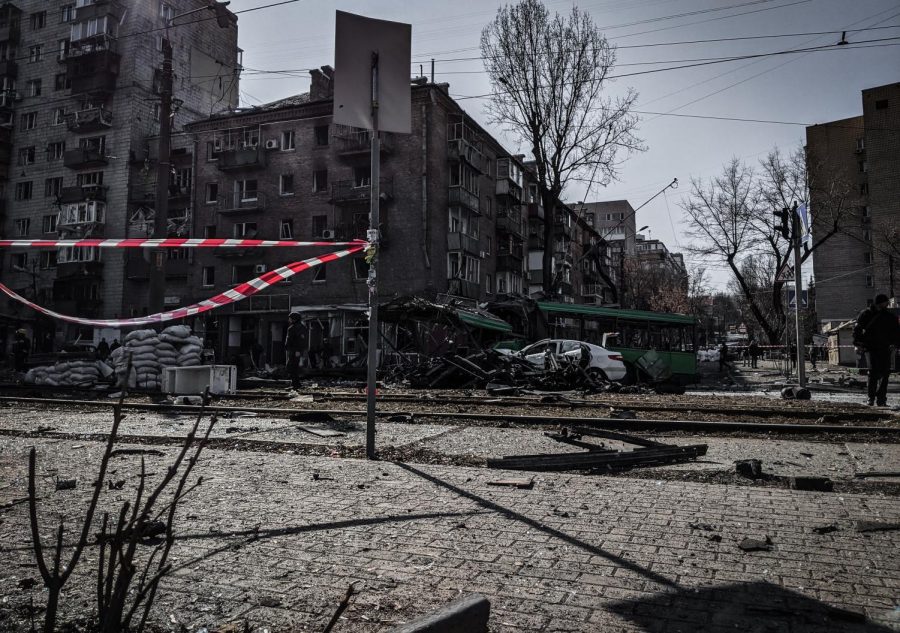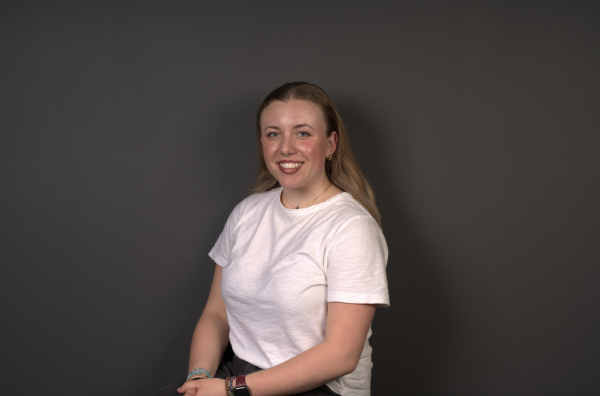UWO professor reflects on life in Iziaslav, Ukraine
‘We’re not going to lose this war’
Courtesy of алесь усцінаў / Pexels Rubble and debris from buildings clutter the streets of a Ukrainian city. Since Russia’s invasion in February 2022, more than 8 million Ukrainians have fled the country. At least 6,000 Ukrainian children have been taken to Russian camps and other facilities.
March 29, 2023
In the one year since Vladimir Putin directed Russian forces to invade Ukraine, more than 8,000 civilians have died and another 13,000 have been injured. Villages have been wiped out and billions of dollars of infrastructure have been destroyed.
But Oksana Katsanivska, an anthropology professor at UW Oshkosh, remains optimistic that Ukraine will survive as she reflects on her year in the United States after leaving her home in Iziaslav, Ukraine.
Jordan Karsten, the department chair of anthropology, global religions and cultures, had a hand in helping Katsanivska and her family get into the United States..
“It was bittersweet to bring Oksana and her family to the U.S.,” Karsten said. “Of course, it is always wonderful to see friends and I was very happy that they were in a safe place. But, I know they would much rather be home, and you feel powerless to help with that.”
Russian forces attacked Ukraine on Feb. 24, 2022, and Katsanivska left her home on March 4. She said she’s feeling a little better now after being gone for over a year.
“I love iPhones, but I hate them too,” she said. “They do this ‘one year ago’ thing and (the memories) started popping up on my screen.”
Katsanivska said she felt like she was reliving everything, even though she tries not to look back on those days leaving Ukraine.
She recalls seeing photos of her kids in the basement hiding from the bombing sirens, her family traveling to the border and getting to Italy in those first few weeks of the war.
Katsanivska’s mother and father are staying at her house in Ukraine trying to live as normally as they can.
“My mom is planning on replanting roses,” Katsanivska said. “She has a lot of stuff to do. She’s being positive, or at least she’s trying to be positive when she’s talking to us.”
Katsanivska’s hometown is located in the eastern part of Ukraine, away from active battle fields. However, bombings are still common in the area.
Although they have been given safe haven in the U.S., Katsanivska and her husband are determined to return home sooner rather than later.
They are here on Katsanivska’s worker visa that she recently renewed for another term.
“I was very optimistic when we came here,” she said. “I didn’t go into the details about the longest period (the university guaranteed me), but I think it was five years,” Katsanivska said. “I don’t wanna think that it’s gonna be needed. I want to think that it’s gonna be over.”
When asked if there was any way to predict how the outcome of the war will go, Katsanivska said there really is no way to predict anything.
“You could predict it if it was logical, but this is not logical,” she said. “This war is breaking all the rules of logic possible because a smaller — much smaller — country is standing against a much bigger country according to everything.”
Katsanivska expresses great pride in her Ukrainian identity.
“What I can say is that Ukrainians are not losing optimism,” Katsanivska said.
She comes from a small town where she felt like nothing really happened. But now, during war time, people have been opening children’s clubs, cafés and different boutiques.
“It’s so motivating,” she said. “It’s scary to start a business at any time, but especially during war, you know?”
Katsanivska said that before the war when she’d travel abroad, people asked why she ever came home. Now, people ask when she’ll be back.
“Now it’s different. Now, it’s like OK, are you going to come back?” Katsanivska said. “I’m proud to be Ukrainian.”
“I think Putin was trying to destroy Ukrainian identity,” Katsanivska said. “(But) he made it so much stronger and that makes me believe we’re not going to lose this war.”















